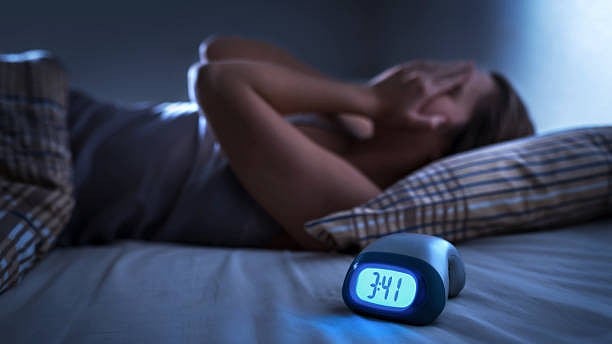
Image for representational purposes.
Credit: iStock Photo
Bengaluru: What began as restless nights soon consumed his days. Sleepless and drained, a middle-aged man from Bengaluru was left jobless after he could sleep for just less than two hours. With burning eyes, high levels of dysfunction and shattered hopes, the man could not even step out of his house. However, therapy brought slow but steady recovery, and eventually, a return to work and normalcy.
The intervention was part of a recent pilot study from the National Institute of Mental Health and Neurosciences (Nimhans), which has revealed that improving sleep health can significantly enhance well-being, specifically for people suffering from common mental disorders like depression and anxiety.
The study, being conducted by Jemimah A Johnson, a PhD Scholar at the Department of Clinical Psychology, NIMHANS, under the guidance of Dr Paulomi M Sudhir, Professor, Clinical Psychology; and co-guidance of Dr Shyam Sundar A Professor, Psychiatry and Dr Ravi Yadav, Professor, Neurology, explores sleep not merely as a symptom of mental distress but as a central factor in psychological and physical health.
“While sleep has long been treated as an afterthought in mental health care, it needs to be recognised as a primary public health concern. Poor sleep doesn’t just result from mental illnesses, it can also contribute to it,” said Jemimah.
Contrary to the general view that sleep health is measured by duration, Jemimah explained that it should be understood based on six established dimensions: sleep regularity, satisfaction, alertness, timing, efficiency and duration.
After conducting a survey among over 20 patients and interviews with six mental health experts, the researchers experimented with an 8 to 10-session therapeutic intervention.
It was designed to improve sleep health among individuals aged 18 to 59 who reported both sleep disturbances and common mental health concerns.
The one-on-one intervention, which lasted over two months, was tested on five participants who underwent pre-, post-, and three-month follow-up assessments. Each weekly session lasted between 50 minutes and one hour and targeted both behavioural and cognitive patterns (like worries, ruminations) related to sleep and their mood. The results of the pilot intervention revealed that it not only improved sleep health but also saw improvement in coexisting mental health conditions. “Participants felt less helpless, anxious, more confident in themselves, and more capable of managing emotions and routines,” Jemimah told DH.
“While speaking to patients, we found something interesting: a lot of people tried to excessively control their sleep using various strategies. When these attempts were futile, they felt anxious, helpless and it further worsened their sleep. Through therapy, we tried to break this notion and made them accept sleep as a natural process and not to force it,” the researcher said.
Participants in the study described how their long-standing sleep difficulties affected their concentration, memory, emotional stability and interpersonal relationships.
Speaking of the earlier-mentioned middle-aged patient, Jemimah told DH, “He had tried multiple things, and this was like the last option for him. His level of dysfunction was very high; he had even quit multiple jobs because of his poor sleep. We tried to give him a wind-down routine, increase his level of activities, and introduced some relaxation exercises before bed, while restructuring/modifying his unhelpful beliefs on sleep and related
aspects.”
She added that after the intervention, the man is doing much better. “He has found a job after a five-year break and is maintaining well. Now, even if he doesn’t get sleep on a particular day, he is able to not get into panic mode and deal with his daily
functioning.”
Stressing the importance of maintaining a healthy sleep schedule, the researcher highlighted that while sleep difficulties can lead to multiple physical health problems,
including weakened immunity, high blood pressure and memory issues, they can also exacerbate existing mental health
conditions.
Maintaining a wind-down routine one hour before going to sleep can help one get a healthy sleep; it can include stretching, taking a warm bath, dimming the lights, reading and avoiding screens.
Following a successful pilot study, the researchers are now working to expand the sample size to further test the efficacy of the intervention.